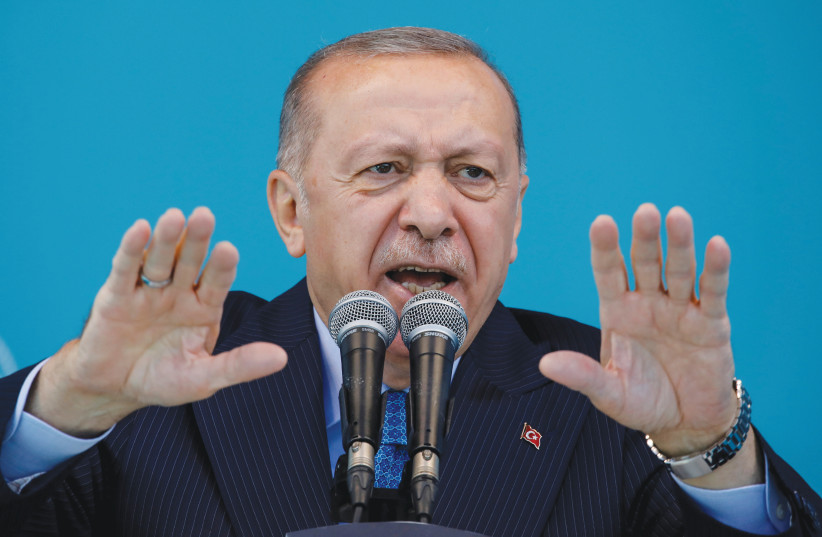Turkey’s foreign minister, Mevlut Cavusoglu, visited Israel this week, a sign that Israel and Turkey may be on a path to reconciliation, after a decade of antagonism. However, Jerusalem has made it clear to Turkish President Recep Tayyip Erdogan that the expulsion of Hamas leaders from Turkish soil is a prerequisite for closer ties. It remains unclear if Ankara has finally kicked out the Gaza-based terrorist organization. What is clear is that if Hamas loses its Turkish sanctuary, its options for a new one are limited.
For the past ten years, Saleh al Arouri has been operating a Hamas headquarters in Istanbul. Arouri is a United States-designated and sanctioned terrorist with a $5 million (NIS 16.8 m.) bounty on his head. He has the blood of tens of Israelis on his hands and languished in an Israeli jail for more than a decade until Israel released and exiled him in the context of a 2011 prisoner exchange. In 2014, Arouri claimed responsibility for the kidnapping and murder of three Israeli teenagers, an event that sparked a 50-day war between Israel and Gaza. Jerusalem is likely adamant that Arouri must go if Ankara wants better relations.
Israeli and Lebanese news outlets have reported that Turkey is giving Hamas leadership the boot. However, the reports are based on statements made by unnamed sources, and nothing is confirmed. While Turkish officials have denied carrying out deportations, it is possible Ankara simply refused reentry to Hamas leaders after trips abroad, thereby complying with Israel’s conditions while maintaining plausible deniability.
Why would Erdogan reverse himself this way after a decade of harboring Hamas leadership and cheerleading the Muslim Brotherhood? The short answer is Turkish elections in 2023. Turkey’s flailing economy and spiraling inflation have resulted in an unprecedented lack of popularity for the Turkish president.
If Erdogan’s recent charm offensive can warm relations with the Jewish state, it could help Turkey’s bottom line. Israel has proposed a pipeline that will connect Europe to the vast natural gas resources in Israeli waters, and Erdogan wants a piece of the action. However, after years of Erdogan spouting pro-Islamist, antisemitic and anti-Israel vitriol, it remains to be seen how far he is willing to go to avail himself of these economic opportunities. In the past, Turkey enjoyed prosperity without Erdogan having to compromise his Islamist agenda.

At the beginning of the last decade, things seemed to be going Erdogan’s way. Sunni Islamists – above all the Muslim Brotherhood – appeared to be on the rise politically, riding the tide of the Arab Spring. This boded well for Erdogan’s Justice and Development Party (AKP), which has Islamist roots and promotes the Muslim Brotherhood abroad. Erdogan went all-in, applauding the fall of Arab dictatorships and the rise of Muslim Brotherhood influence.
Erdogan's change of direction
ERDOGAN’S ENTHUSIASM and support for the Muslim Brotherhood put him at loggerheads with Sunni Arab leaders that consider it an existential threat. Unfortunately for Erdogan, the Muslim Brotherhood and its allies proved to have little staying power in regional governments, leaving Ankara increasingly isolated. Erdogan’s isolation is a political liability, so a diplomatic recalibration is in full swing, and reconciliation with Israel and its Abraham Accord partners are high on Erdogan’s agenda.
Hamas may become collateral damage, as Ankara mends fences with pro-Western Arab governments and Israel. If Hamas is expelled from Turkey, it would not be the first time Hamas has been shown the door. Jordan kicked Hamas out in 1999. Saudi Arabia did the same in the early 2000s, when Riyadh cracked down on jihadist organizations, after a spate of domestic terrorism. During the Syrian civil war, Hamas sided with the anti-regime forces and quickly found itself in hot water, which led to the shuttering of its Damascus headquarters, in 2012. In 2013, a military coup brought down the short-lived Muslim Brotherhood government in Cairo and Hamas became persona non grata in Egypt.
As more Middle Eastern countries outlaw and suppress the Muslim Brotherhood, Hamas’s options have dwindled. The likely candidates for new host countries are Qatar, Hezbollah-controlled Lebanon or Iran. Malaysia could also be a possibility.
Qatar has been a patron of Hamas since the group left Syria and hosts the head of the Hamas politburo, Khaled Meshal. Meshal lives like royalty in Doha and is estimated to have a net worth in the billions of dollars. Over the past ten years, Doha has injected tens of millions of dollars into Gaza, sometimes arriving in suitcases full of cash.
If Ankara really does give Hamas the boot, the US will have an important role to play in pressing regional partners not to tolerate Hamas on their soil. The Biden administration recently upgraded Qatar to the status of major non-NATO ally. That accolade is indefensible, given Qatar’s long-standing patronage of Hamas. The administration should also act now to convince Malaysia that harboring Hamas would make it a pariah. Hamas could still retreat to Hezbollah-held Lebanon or Iranian territory but would expose Arouri and his ilk for what they really are: a servant of Tehran’s interests with very few friends left in the world.
The writer is the senior director of the Israel Program and the FDD National Security Network at the Foundation for Defense of Democracies. Follow Enia on Twitter at @EKrivine
